The organizer of a much-hyped soccer match that intended to showcase Lionel Messi in Hong Kong said Friday it would offer a 50 percent refund following days of backlash from angry fans and the government over the absence of the World Cup winner.
Hong Kong fans were frustrated after Messi stayed on the bench for the full 90 minutes in a game against a local team due to a groin injury. The grievance spread to mainland China after the Argentina star put in a 30-minute appearance in a game in Tokyo in Inter Miami’s exhibition match on Wednesday.
Over the past two days, many social media users in mainland China expressed their disappointment over Messi’s no-show, with China’s state-run newspaper, the Global Times, publishing an editorial that said the impact of the controversy surrounding the football star “has far exceeded the realm of sports.”
In an Instagram post on Friday, local organizer Tatler Asia apologized to those who were disappointed by the match and said it was upset by “the seeming lack of respect shown to the crowd.”
It reiterated it had pleaded with Inter Miami’s management to urge Messi to explain to the spectators after it learned the football star, who was required to play for 45 minutes unless injured under their contract, would not be playing.
“He didn’t. The fact that Messi … played in Japan on February 7th feels like another slap in the face,” it said.
The organizer said it had been in talks with the government on how to resolve the issue and details of the refund arrangement would be announced by mid-March.
“We will not escape our responsibility as organizers and that is why Tatler Asia will offer all those who purchased match-day tickets from the official channels a 50% refund,” it said.
Tickets for the game cost up to 4,880 Hong Kong dollars ($624) each. In its statement, Tatler Asia said it would refund 56 million Hong Kong dollars ($7.2 million) in total, resulting in a loss of 43 million Hong Kong dollars ($5.5 million). Before the refund, its net income stood at 13 million Hong Kong dollars ($1.7 million), the organizer said.
Tatler Asia on Monday already said it would withdraw an application for funding from the city government for staging the match.
In response to the announcement, the Hong Kong government welcomed the arrangement in a statement, calling it as a responsible move. But it said the Hong Kong society still has many questions over the incident, especially after seeing Messi playing actively in Japan, and hoped Inter Miami can provide a reasonable explanation to the public.
Inter Miami has not immediately responded to the Associated Press’ request for comment.
After the PR disaster erupted on Sunday, Messi had tried to address the widespread disappointment by explaining why he did not play in a news conference in Tokyo.
He also said it was regrettable that he could not play in Hong Kong due to an injury on Chinese social media platform Weibo. He said in the post that he hoped to return to Hong Kong to play for his fans and go to mainland China to share the joy of football.
But his appearance in the Tokyo match on Wednesday intensified the criticism against his absence beyond Hong Kong, where the government had sought to use the Sunday game to boost the city’s image as a hub for mega events.
On Wednesday night, the Global Times said in the editorial that the explanations from Messi and Inter Miami were not convincing and pointed to some speculations about the moves.
“One theory is that their actions have political motives, as Hong Kong intends to boost economy through the event and external forces deliberately wanted to embarrass Hong Kong through this incident,” it said. “Judging from the development of the situation, the possibility of this speculation cannot be ruled out.”
Pro-Beijing politicians in Hong Kong also weighed in. Regina Ip, a leading member of the Executive Council, Hong Kong’s Cabinet, wrote on X, formerly known as Twitter: “Messi should never be allowed to return to Hong Kong. His lies and hypocrisy are disgusting.”
On Weibo, some Chinese social media users said their country does not welcome Messi and asked him not to come again. But others defended Messi by saying he had interacted with Hong Kongers.
In June 2023, Messi received a rapturous response when he played in a friendly match between Argentina and Australia in Beijing.
The February 7 match in Japan wrapped up Inter Miami’s global promotional tour – stretching from El Salvador to Dallas into Saudi Arabia and Hong Kong and ending in Tokyo. Inter won only one of the six games.
The Miami preseason wraps up on February 16 in Florida against Newell’s Old Boys, Messi’s boyhood club from Rosario, Argentina. Many expect him to finish his career there.

































